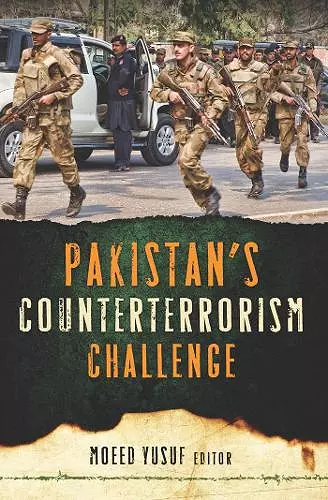Pakistan's Counterterrorism Challenge
Format:Paperback
Publisher:Georgetown University Press
Published:18th Feb '14
Currently unavailable, and unfortunately no date known when it will be back

The book stands out for being a very comprehensive, brilliantly insightful analysis of the terrorist challenge in Pakistan, its impact on global security, and the possible way forward. A must-read for anyone interested in having a holistic and objective view of terrorism in Pakistan. -- Tariq Parvez, former National Coordinator, National Counter Terrorism Authority (NACTA), Pakistan, and former director general, Federal Investigation Agency, Pakistan Moeed Yusuf has brought together top analysts to assess Pakistan's counterterrorism challenge, and they have provided a sobering analysis. Uniformly rigorous and extremely well-informed, they outline Pakistan's deep challenges: lack of policy clarity, lack of coordination, and unresolved civil-military relations. Yet in a brilliant finale, the book describes Pakistan's 'survival of internal paradoxes' that keeps it stable while satisfying no one. These essays are required reading for those grappling with Pakistan's post-2014 future. -- Cameron Munter, professor of International Relations, Pomona College. Served as US Ambassador to Pakistan 2010-12. It is hard to understate the significance of Pakistan's terrorism and militancy problem which has claimed the lives of tens of thousands of Pakistanis. Terrorists have also succeeded in killing so many of Pakistan's leading politicians, not least two-time Prime Minister Benazir Bhutto. At the same time, Pakistan has also incubated the groups that have perpetrated some of the deadliest terrorist attacks of the past decade, from the London Underground bombings of July 7, 2005, to the assaults in Mumbai in November 2008. Therefore it is especially fitting that Moeed Yusuf, one of the world's leading experts on Pakistan, has assembled an all star cast of Pakistan experts to consider how best to understand this scourge and what to do about it. Yusuf's skillfully edited volume is essential to understanding Pakistan's security challenges and possible ways to deal with them. -- Peter L. Bergen, author of Manhunt: The Ten-Year Search for Bin Laden from 9/11 to Abbottabad
Focuses on violence being perpetrated against the Pakistani state by Islamist groups and how Pakistan can address these challenges, concentrating not only on military aspects but on the often-ignored political, legal, law enforcement, financial, and technological facets of the challenge.Pakistan, which since 9/11 has come to be seen as one of the world's most dangerous places and has been referred to as "the epicenter of international terrorism," faces an acute counterterrorism (CT) challenge. The book focuses on violence being perpetrated against the Pakistani state by Islamist groups and how Pakistan can address these challenges, concentrating not only on military aspects but on the often-ignored political, legal, law enforcement, financial, and technological facets of the challenge. Edited by Moeed Yusuf of the US Institute of Peace, and featuring the contributions and insights of Pakistani policy practitioners and scholars as well as international specialists with deep expertise in the region, the volume explores the current debate surrounding Pakistan's ability-and incentives-to crack down on Islamist terrorism and provides an in-depth examination of the multiple facets of this existential threat confronting the Pakistani state and people. The book pays special attention to the non-traditional functions of force that are central to Pakistan's ability to subdue militancy but which have not received the deserved attention from the Pakistani state nor from western experts. In particular, this path-breaking volume, the first to explore these various facets holistically, focuses on the weakness of political institutions, the role of policing, criminal justice systems, choking financing for militancy, and regulating the use of media and technology by militants. Military force alone, also examined in this volume, will not solve Pakistan's Islamist challenge. With original insights and attention to detail, the authors provide a roadmap for Western and Pakistani policymakers alike to address the weaknesses in Pakistan's CT strategy.
This edited volume is not only timely but addresses a pertinent, complex and under-researched issue using an unusually holistic lens of analysis... An important contribution to the literature and will be of interest to both laypersons as well as those who are already much more familiar with the complex landscape of Pakistani [counter-terrorism]. South Asia: Journal of South Asian Studies
ISBN: 9781626160453
Dimensions: unknown
Weight: 408g
208 pages